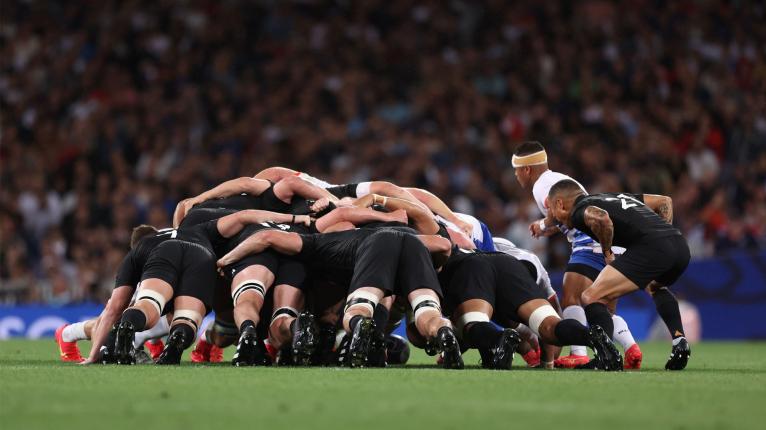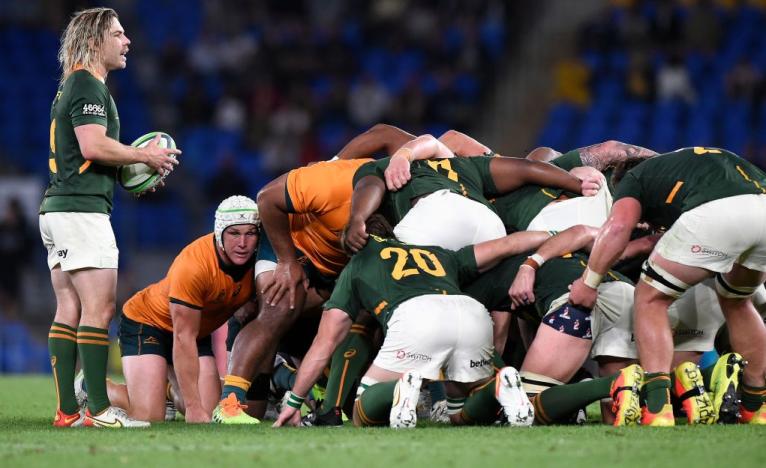The All Blacks have convinced themselves that the key to winning this World Cup, or at least being able to utilise the full array of attacking weaponry they have brought to France, is to build everything on the strength of their scrummaging.
Listening to Ian Foster, and his various assistant coaches since the All Blacks lost their opening game to France, they have come to believe that if the team scrum well, the team will play well.
This is hardly a revelation. The French have long worked to the mantra, “No scrum, no win” and in the Northern Hemisphere this kind of prophesying is called stating the obvious.
But it is a departure from the norm for the All Blacks, who don’t typically obsess about the scrum the way other nations do.
Yes, they have always wanted to scrum well, but they haven’t overtly linked it to the relative ability of every other part of their game before, the way Foster did ahead of playing Namibia.

“You’ve got to get your set-piece right,” Foster said. “If you start to creak there or you misinterpret what the refs want, then that generates pressure. That was one of the big lessons in that France game.
“We’ve got to get that right. I’ve probably given you a pretty good clue about what’s a big focus for us on Friday. That probably reflects in the selection of sticking with the four props that we used. We need to fix up some areas there.
“I think once you get consistency in those big rock parts of your game, the rest is sitting there ready to go. But we’ve got to show that.”
It wasn’t just against France that the All Blacks had trouble in the scrum – they were crunched and buckled there by the Springboks in the last game before the World Cup.
And so this newfound obsession with building everything from their scrum is due to Foster seeing what sort of rugby is prevailing so far at this tournament.
In the first round of games, it was the teams who chose not to play with the ball who were the most successful. France booted the ball away for most of the first half in Paris against the All Blacks and kept the aerobic content down to just 27 minutes.
It’s not just that a dominant scrum is an excellent attacking platform or a prolific source of penalties, it’s the psychological damage it inflicts on the opposition.
That was, according so some astute analysis out of Ireland, a deliberate plan because the statistics show that the best way to beat the All Blacks is to not hold the ball for more than 20 seconds at a time and to not get into a glorified game of sevens against them.
When the All Blacks hammered the Wallabies 38-7 earlier this year in the Rugby Championship, the ball was in play for 41 minutes and that is what the All Blacks want.
What we have shaping up in France is a culture clash – an intriguing strategic battle between the likes of France, South Africa and Ireland who want to build the game around the set-piece and keep things structured and tight to methodically break teams down, only pushing passes wider when they have created lower risk opportunities to do so.
And against that, we have the All Blacks, who want the game to be aerobic, for the ball to be shifted to the widest parts of the field and for defences to be mostly unstructured.
For the All Blacks to get what they want, though, they have to be able to use their scrum as a weapon – or at least ensure its not leaking penalties and putting them under pressure as it was against South Africa and France.
It’s almost impossible to build momentum and speed the game up if the scrum is being dealt to and this is essentially what Foster was getting at it – the preferred high-tempo the All Blacks want to play needs a foundation.

It’s not just that a dominant scrum is an excellent attacking platform or a prolific source of penalties, it’s the psychological damage it inflicts on the opposition and the way it builds the confidence of the pack in all other areas of the work.
The evidence for that was apparent in Toulouse, where the All Blacks’ second try came from a destructive scrum in which Namibia were sent reeling.
It was a big moment in the context of the game – not because it led to the second All Blacks try – but because the whole evening clicked into place after that.
“We got a try out of it,” said All Blacks hooker Samisoni Taukei’aho off that first set-piece.
“It was a good scrum to start off the game and get that momentum going and it flowed into the game.
“As a front-rower, when your set-piece is going well everything else on the field can flow from there. We got a few penalties against our scrum last weekend, and we needed to tidy that up.
The Boks have come to his World Cup with a desire to beat everyone up. They are huge men, and they love using their scrum as the central piece in their displays of power.
“Namibia have a good scrum and we laid a platform at the start of the week that we really needed to dominate scrum and lineout and we came out and executed so I’m happy.”
That psychological stuff is more important than many observers realise because as much as a dominant scrum can send confidence surging through a pack, so too can it drain a team if they aren’t able to get what they want from that facet.
That would be particularly true of South Africa and to a lesser extent France. The Boks have come to his World Cup with a desire to beat everyone up.
They are huge men, and they love using their scrum as the central piece in their displays of power. In their opening game against Scotland, the turning point came midway through the second half when they were able to win scrum penalties almost at will.
That shattered the Scots and their former coach, the legendary Jim Telfer, told RugbyPass this week: “You could see the work the Scottish font five have put into the scrums, and they worked tremendously hard to get as low as they possibly against the Boks.
“That was a tactic we used with the British and Irish Lions in 1997, to get under them and negate their power in the scrums.”
Take the scrum away from the Boks and their game doesn’t carry the same threat and conversely, what became apparent in Toulouse was how well the All Blacks played after that statement-making scrum.

Former Boks coach Allister Coetzee, who is now in charge of Namibia, said he hadn’t seen the All Blacks with such confidence in their skill execution for years.
And while there will be critics who say that looking a million dollars against the world’s 21st ranked team is hardly evidence the All Blacks are on their way to a fourth world title, the flow that they built in Toulouse was illustrative of how much confidence a good scrummaging performance can generate.
“After last week’s performance we needed to bounce back and get back into the winner’s circle and we didn’t take Namibia lightly,” said Taukei’aho.
“We prepared accordingly. We got the ball rolling in this World Cup. We never underestimate any team.
“Being an All Black you have got a standard you have to play up to and being an All Blacks forward you have to front. And we fronted tonight. It was a good start. The group is confident. The confidence is still there, and we trust in each other’s ability.”



Comments
Join free and tell us what you really think!
Sign up for free